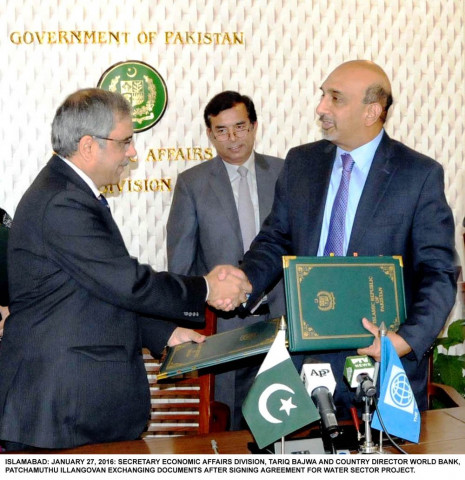Water sector management: Pakistan borrows $35m from World Bank
Government aims to pay salaries, conduct studies for water sector management with the additional amount

Secretary Economic Affairs Division Tariq Bajwa and Country Director World Bank Patchamuthu Illangovan exchange documents after signing a loan agreement in Islamabad on January 27, 2016. PHOTO: PID
Secretary Economic Affairs Division Tariq Bajwa and Country Director of World Bank Patchamuthu Illangovan signed the agreement of $34.95 million as additional financing for Pakistan Water Sector Capacity building advisory services project, according to an official handout.
The capacity building project has been under implementation since 2008 with $38 million financing from the World Bank. It was scheduled to be completed by 2014 but was extended by another year.
External debt may swell to $70 billion by year-end
With the additional $35 million, the total debt financing for the study has reached $73 million.
“The project will improve management of Indus Basin in Pakistan," tweeted, Illangovan after the signing ceremony.
#aiminghigh the project will improve management of Indus Basin in #Pakistan read more. https://t.co/F5kW5i4s1L
— Illango (@Illango_WB) January 27, 2016
The project's objective is to improve the management and investment planning of water resources in the Indus River Basin.
According to project documents, $10.6 million will be utilised for ‘Capacity Building of and Support to Federal and Provincial Institutions in Water Resources Planning and Management’, whereas $7.23 million will be spent on project management and additional studies.
As many as $17.2 million will also be spent for improvement in water resources management and development.
The government has contracted the loan amid warnings from independent economists and Moody’s – the credit rating agency, about the sustainability of the external debt.
Pakistan's economy reaches pivotal point, medium term outlook positive: IMF
Moody’s had warned in November that Pakistan’s debt affordability had weakened after it shifted to non-conventional loans by issuing $3.5 billion worth of international bonds.
The government also received $956 million external loans in last the four months from commercial banks, and the IMF has projected Pakistan’s external debt to grow to $70 billion by June 2016.
Although $35 million appears to be a small amount, its utilisation raises questions over needs assessment, as salaries of consultants and studies can be completed, without borrowing foreign loans.
“Foreign loans are only productive when utilised for asset building as this provides a source of earning to return the loans,” argues Dr Kaiser Bengali – an economist, in his recent study.
The statistics suggested that with a shift in focus from project to programme loans, the country’s infrastructure is completely ignored and has started to collapse, he said.

1733130350-0/Untitled-design-(76)1733130350-0-208x130.webp)

















COMMENTS
Comments are moderated and generally will be posted if they are on-topic and not abusive.
For more information, please see our Comments FAQ